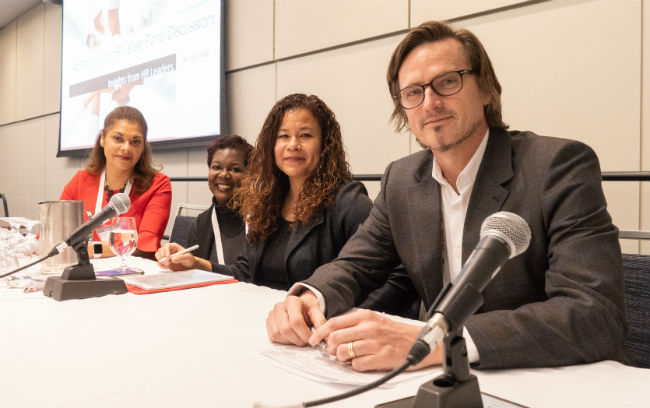Expert panel shares insights on how to stay relevant in the field

Taking risks, consistent networking and following the road less travelled by can make all the difference for human resources professionals seeking opportunities to get ahead, according to a panel of experts.
“Your career is not necessarily going to be always on the trajectory up,” said Su Diana, senior manager of learning and talent development at Foresters Financial in Toronto.
“It’s OK to sort of do the jungle gym around it. It’s not necessarily about the title, but it really is what you’re passionate about and making sure that you’re in the right organization where there’s a cultural fit for you.”
Diana’s career began in a call centre environment, she said, speaking at the annual conference of the Human Resources Professionals Association (HRPA) in Toronto on Jan. 31.
“Someone one day asked me if I wanted to help train our new hires. I did it and I found I really liked helping other people learn about their new role. That's really how I fell into learning and development and I was really able to grow my career within financial services.”
Finding your way to HR
The panel — which also included Diana Elder, executive director of human resources at the University Health Network in Toronto, and Peter Neufeld, vice-president of leadership at Maple Leaf Foods in Toronto — shared insights on what it takes to be successful in various HR career paths.
Some career journeys resemble spider webs rather than ladders, according to Elder.
For instance, when Elder took on a claims processing role at a large insurance organization 20 years ago, she knew several lateral moves would be required before she could earn her preferred role in HR.
“Filling out my resumé in that way has really worked for me," she said.
“In terms of learning about human resources, it was really difficult to understand how you got into a human resources department, to be honest with you. It was called ‘Personnel’ and there was some mystery about who got to be in there and who didn't. I had decided that I wanted to be in HR but wasn't quite sure how to get there.”
Neufeld worked as a therapist at an addiction centre before he became interested in organizational development work, which set him on his current career trajectory.
Transferable skills were of great importance in his journey, he said.
Being open to unconventional career opportunities is helpful when attempting to move forward, said Diana.
Often, such opportunities come through networking and building relationships, she said.
“As an HR professional, it’s really important for us to get out there, network, find someone who’s passionate about the same things you are, have conversations,” said Diana. “That’s really the way you’re going to learn. You’re going to pick up new ideas and new ‘aha’ (moments), if you will.”
Such relationships do not necessarily need to be made through formal mentorship programs to be successful, she said.
“You might find that people will just naturally help you along the way. It doesn’t have to be a rigid program or process.”
Informal networking opens doors, especially in the small world of HR professionals, said Neufeld.
“It’s really not that big,” he said. “Our HR world is extremely small, so whenever you connect with people… I’d say really hold on to that.”
In addition, choosing to take leaps of faith — even ones that make you uncomfortable — can make all the difference, according to Elder.
“If you’re feeling too comfortable in the role that you’re in… There’s your answer.”
Ambitious HR professionals can fall prey to perfectionism when it comes to career planning, she said.
“You’re going to make mistakes and that’s OK. Make sure you just learn from them, pick yourself up and move on.”
And once in the field, it’s not necessary to know all of the answers, said Elder.
“Yes, you’re the HR professional, but nobody expects you to know everything. It’s actually by opening up and being vulnerable that you’re able to build stronger relationships. People see you as being human and approachable. It’s really a strength and takes some courage to do.”
Anticipating the future
The role of HR is rapidly becoming one of holistic business advisement, said Neufeld.
The focus needs to be on overall corporate results, rather than the HR function in isolation, he said.
“A key attribute is to be a credible person who understands the business, understands how you make money, understands the challenges that you have, and (you) go very, very deep within that.”
This type of total business understanding cannot be underscored enough, said Diana.
“At the end of the day, our business leaders want to make sure that HR is helping them to improve their bottom line.”
And with HR becoming more digital by the day, it is important for HR to stay ahead of the curve, especially in terms of soft skills and change management, said Elder.
“There are many things that we do now in HR that will no longer exist.”
As such, emotional intelligence is a crucial tool for HR to appropriately navigate the digital age, said Diana.
“Business knowledge is table stakes,” she said. “But we also need to appreciate the value of having really good relationship-management skills, really good relationship-building skills.”
The ability to influence business leaders will matter even more going forward, according to Diana.
“You’re going to have to have some tough conversations,” she said. “You really have to hone and finesse your influencing skills. It is a fine art to be able to influence a business leader, who may be one, two or three levels above you.”




